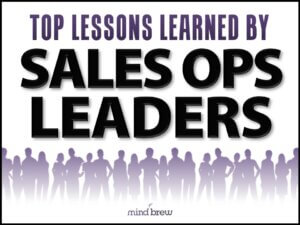As any organization grows, there’s an inevitable tendency toward ever greater specialization. Not being exempt from this dynamic, it’s common for Sales Ops to add roles over time that focus narrowly on particular areas—i.e. hiring data analysts to crunch the numbers, compensation specialists to chaperon incentives and quotas, systems administrators to manage the sales technology stack, project managers to shepherd big initiatives, etc.
On the surface, this trend toward specialization is intuitive and logical…
After all, when your team has experienced data analysts whose sole focus is mining CRM data or trained project managers dedicated to rolling out new sales processes or tools, you can’t help but benefit from all that deep expertise and concentrated attention. And in an increasingly competitive business environment, the appeal of putting “subject matter experts” in key areas is undeniable.
Beyond that, specialization is also appealing from an organizational development standpoint. It can sometimes be easier to recruit someone into a position that has a very specific job title and description, such as “Senior Sales Operations Data Analyst, Level 2.” And with this type of specialization, it’s a fairly straightforward matter to define linear career paths that are clear to everyone.
All that being said, however, specialization can have some serious downsides…
When roles become too narrow, functional silos can form and blind spots will often develop. Each siloed function can end up pursuing its own needs and ends without really considering the impact to the overall operation. And as the functional silos focus on disparate parts of the much larger interconnected system, any lack of cross-functional understanding and coordination can lead to inefficiencies, confusion, and overall performance problems.
Another challenge with highly specialized roles is that specialists will often develop a “hammer and nail” mentality, where their expertise is a hammer and they can’t help seeing every problem as a nail. And as they tend to view problems through the lens of their particular expertise, specialists will often fail to recognize the broader organizational dynamics and overlook critical trade-offs and connections.
The reality is that Sales Operations is more than just a collection of individual functions—it’s an interconnected ecosystem. And to help manage this ecosystem effectively, teams need individuals who understand how all of the pieces fit together. Enter the “Swiss Army Knife”— a Sales Ops professional whose skills and knowledge spans multiple areas of sales operations, enabling them to see the larger picture and make better, more holistic decisions.
Generalists, aka “Swiss Army Knives,” play a crucial role in navigating the complexity of Sales Operations. They can look at proposed changes and recognize how those changes will ripple across the various interconnected systems and processes. They can understand and articulate the downstream or follow-on effects of different decisions and alternative scenarios. And generalists are often able to anticipate the trade-offs and unintended consequences in ways that specialists often miss.
These multifaceted professionals also tend to foster better communication and collaboration across the organization. By understanding the concerns of different teams, they act as translators between various functions, facilitating discussions that lead to more comprehensive and balanced solutions. Their ability to see the big picture allows them to integrate different perspectives, ensuring that Sales Ops functions as a cohesive whole rather than as a collection of isolated silos.
The good news is that while you might not have many natural “Swiss Army Knives” on your team, you can develop many of these attributes in your specialists. The key is to promote broader learning and cross-functional training and experience.
Here are just a few of the strategies we discuss in the on-demand Developing Exceptional Sales Ops Leaders webinar:
- Holistic Training and Professional Development: Offer professional development programs that emphasize systems thinking, critical reasoning, and broad-based business knowledge. Invest in training that exposes specialists to the bigger picture and teaches them how their work impacts and intersects with other areas of the operation.
- Cross-functional Projects and Ad Hoc Teams: Encourage team members to step-up and participate in cross-functional projects and strategic initiatives that may be outside of their immediate area of expertise and responsibility. Provide opportunities for team members to gain a broader perspective and expand their base of experience.
- Mentorship and Rotational Programs: Identify team members with potential who may just require a bit more encouragement and one-on-one coaching. Consider rotating team members between different Sales Ops functions and roles to give them more hands-on experience and deepen their appreciation of the entire Sales Ops ecosystem.
The bottom line is that to deliver more strategic, integrated solutions that truly support the entire sales organization in the most effective and efficient way, Sales Ops teams need to strike a balance between specialization and generalization. Both approaches are extremely important and valuable, albeit for different reasons.
And with a thoughtful and proactive program, you don’t have to choose one approach or the other—you can develop team members that possess both sets of skills, capabilities, and perspectives.














